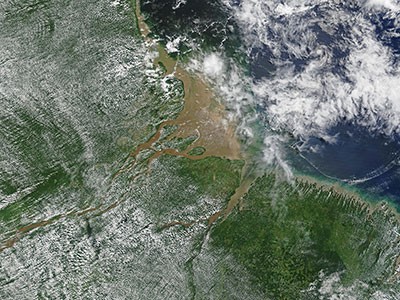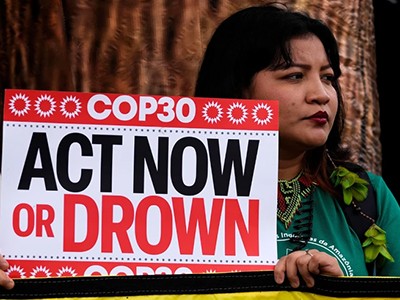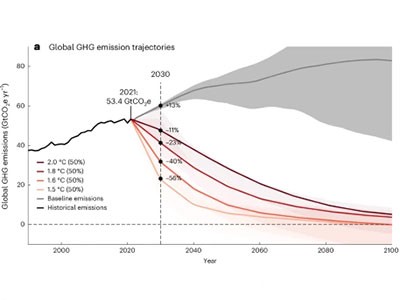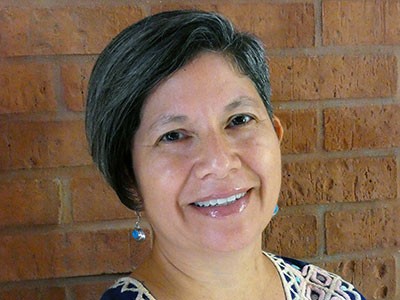The work of COP30 President André Corrêa do Lago and Brazilian Environment Minister Marina Silva is set to continue at COP31 in Antalya, Türkiye.Photo: Pablo Porciuncula/AFP/Getty
The 30th UN climate conference, COP30, ended on Saturday evening with an agreement among the 195 participating countries. The US, which withdrew from the 2015 Paris climate agreement earlier this year, did not send a delegation. The absence of the world's second-largest emitter of carbon dioxide was not the only disappointment. The meeting, which took place in Belem, Brazil, did little to make progress given the decisions made and the eight-page document. final document barely moving the dial toward slowing climate change or preventing its most dangerous consequences.
Don't abandon climate COPs, reform them
There were also positive moments. Delegates to this Conference of the Parties (COP) agreed to a significant increase in “adaptation finance,” under which high-income countries finance projects, ideally through grants, that protect low- and middle-income countries (LMICs) from the impacts of climate change. But although COP30 was called “implementation of the CS', the core issue of phasing out fossil fuels was not included in the final text. Even by the standards of COP meetings, the situation is stagnant.
In 2021, governments attending COP26 in Glasgow, UK, agreed to “phase down” the use of coal without carbon capture and eliminate subsidies for fossil fuel companies. Then at COP28 in Dubai they set a goal of “fossil fuel transition”. But despite the efforts of a coalition of at least 80 countries from around the world, COP30 negotiators could not even agree on the need for a road map for this transition. This failure was largely the result of opposition from oil-producing states, led by Saudi Arabia and including powerful countries such as India and Russia—collectively known as the “like-minded group.”
Next year, the COP will be held in Antalya, Türkiye, and will be jointly organized by the governments of Australia and Turkey. The two host countries and their allies have 12 months to bring a fresh perspective to a stalled process that risks exposing current and future generations to the dangers and uncertainties of a warming planet. Fossil fuels must be phased out in a fair and equitable manner if the world is to prevent dangerous climate change. The challenge is how to bring the roadmap debate back to COP31 and avoid a repeat of the COP30 outcome.
“Practical implementation”: why the Belém summit must step up action on climate change
While Brazil was unable to succeed this time around – or agree on a separate plan aimed at stopping deforestation – the country intends to continue informal discussions on road maps to achieve both goals with those countries that supported the development of such plans. This is positive and echoes the call made in these pages last month for the creation of informal spaces for policymakers and academics to discuss contentious issues at UN negotiations (Nature 6461025–1026; 2025).
However, agreement on how to end the use of fossil fuels will not be reached as long as the current standoff continues. Those countries that object to even the idea of discussing a road map say they cannot put their economies at risk. This is a legitimate concern, and any roadmap discussion must include the necessary details on how to mitigate this phenomenon.
However, national interests will not be served unless all countries can be persuaded to recognize the enormity of the larger picture. This is a key lesson from the 2015 Paris climate agreement, as well as agreements in other areas that have succeeded against all odds, including this year's agreement on… pandemic treaty. They succeeded, at least in part, because rich and poor countries realized (or accepted) that unless they acted together, there would be risks for everyone, including themselves.
Navigating the black box of fair emissions targets
The transition to renewable energy is already underway, especially in low- and middle-income countries. But clean energy development will not reduce the risk of dangerous climate change while countries continue to burn fossil fuels at high rates. This is widely accepted and supported by compelling evidence. It is also undeniable that if climate change is allowed to continue at its current rate, no country will be immune from its effects. Yes, richer countries will initially do better than poorer ones. But without coordinated global action, the effects of extreme weather will ultimately harm all countries. It's not enough to say it just once or twice. This needs to be repeated again and again.
The legitimate concerns of states that rely on fossil fuel exports must be taken into account, and any formula for phasing out fossil fuels must be fair and equitable, especially for countries that still on the way to industrialization. Those who can least afford the transition to clean energy must be supported by those who can. But ultimately, it is in the interests of all countries for all countries to move away from fossil fuels. Attempts to block even discussion of this issue must stop.
For real climate action, empower women
COP30's failure to recognize the need for a road map was a missed opportunity, but the fact that the negotiations did not completely collapse provides cause for hope, especially at a time when multilateralism is under severe stress. It is also a sign that countries can yet recapture the spirit of Paris 2015, when it seemed the world had finally woken up to the dangers of global warming and agreed to begin a roadmap to limit global temperature rise to within 2°C of pre-industrial levels – and ideally 1.5°C.
Thirty years after the first meeting of the COP took place in Berlin, and ten years after Paris, this roadmap must be expanded to include a plan to phase out fossil fuels. If this is not done, none of us will remain unscathed.












